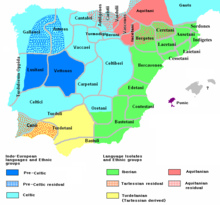
Back Доримско население на Иберия Bulgarian Llista de pobles ibèrics preromans Catalan Liste antiker Ethnien der Iberischen Halbinsel German Pueblos prerromanos Spanish Spagna preromana Italian Povos ibéricos pré-romanos Portuguese Доримское население Иберии Russian Доримські народи Піренейського півострова Ukrainian Danh sách tộc người ở bán đảo Iberia trước thời La Mã Vietnamese
This is a list of the paleohispanic ethnonyms. Until about the year 2001 they were most often considered to be pre-Roman people of the Iberian Peninsula; that is, prior in date to the Roman occupation of the peninsula and vicinity. This article was written with the earlier definition in mind.
The definition, however, was contested by another school of thought, which proposed calling the ethnonyms paleohispanic without implication of date, time, or geopolitical state of affairs. The new definition avoided some major inconsistencies in the old. It was opposed at first but in 2001 with the first issue of the journal, Palaeohispanic, the opposition yielded. Subsequently the pre-Roman theory was obsolete.
The ethnonyms listed in the article, which were taken from various ancient sources, have no single definition. Most are exonyms assigned by the Romans, but in some cases the endonyms are known. An ethnonym may be as simple as a different place name, or it may imply a difference of language or government. In a certain number of cases the population referenced by the name remains unknown. The name is simply listed in a source.
The paleohispanic ethnonyms are pretty much beyond tribes, which belong to an earlier phase of classical antiquity. The polis, or independent city-state, also was in the past. Poleis had been reduced and subjected by Alexander the Great and the diadochi in favor of the imperial province. Socio-political organization under the Romans was entirely provincial, as it had been under the Carthaginians. Residents of a great city such as Valentia were not citizens of it. They were Roman citizens. If an individual changed address he did not move from tribe to tribe or from city to city but only from one locality to another. Wherever he went, his claim to Roman citizenship obtained an instant response from officials charged with insuring that he got his rights. "Civis Romanus sum" insured the place of even those who spoke only Iberian.
© MMXXIII Rich X Search. We shall prevail. All rights reserved. Rich X Search
